Backstory
Across every stakeholder spectrum in the Nigerian economy (i.e. investors, consumers, policymakers or economic observers), one persistent recurring topic is the incessant Naira depreciation against major currencies.
- Specifically, against the major currencies, (USD, GBP, JPY, EUR), the long-run relationship between the Naira and these currencies is a linear depreciating relationship.
Most economists agree that there are broadly eight (8) factors that influence a country’s exchange rate.
- Quantitative factors include inflation rate, interest rate, current account deficit, size of public/government debt and GDP growth rate.
- Qualitative factors include confidence levels in government economic policies, degree of currency speculation and political stability.
You can read more here and here
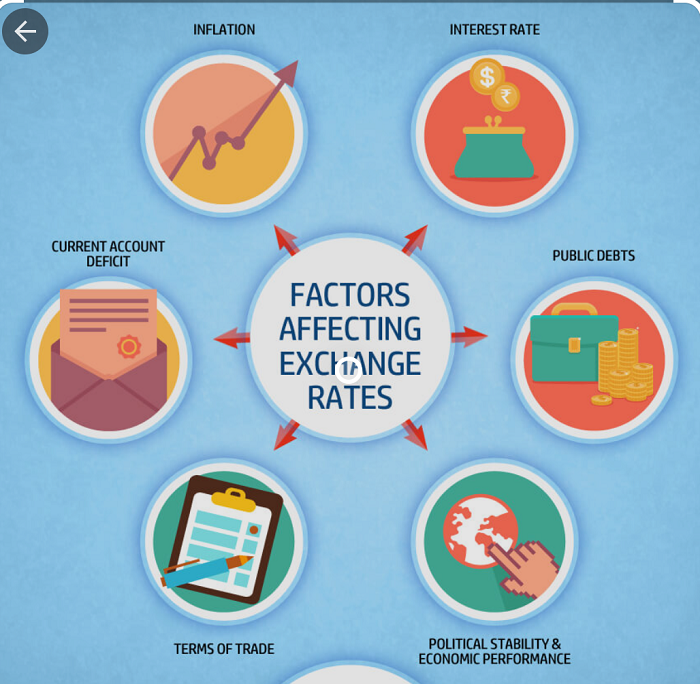 Arguably, these factors are interdependent whereby a change in one or a combination of these factors will typically influence the movement of a currency’s exchange rate.
Arguably, these factors are interdependent whereby a change in one or a combination of these factors will typically influence the movement of a currency’s exchange rate.
- As an example, the Turkish Lira recently experienced a dramatic fall in value. This was partly due to the country’s desire to maintain low interest rates levels despite spiking inflation in Turkey.
- Turkey’s strategy of rate cuts compares to other EM countries, upticking interest rates and driving higher yields to fend off inflation and avoid dramatic currency weakening.
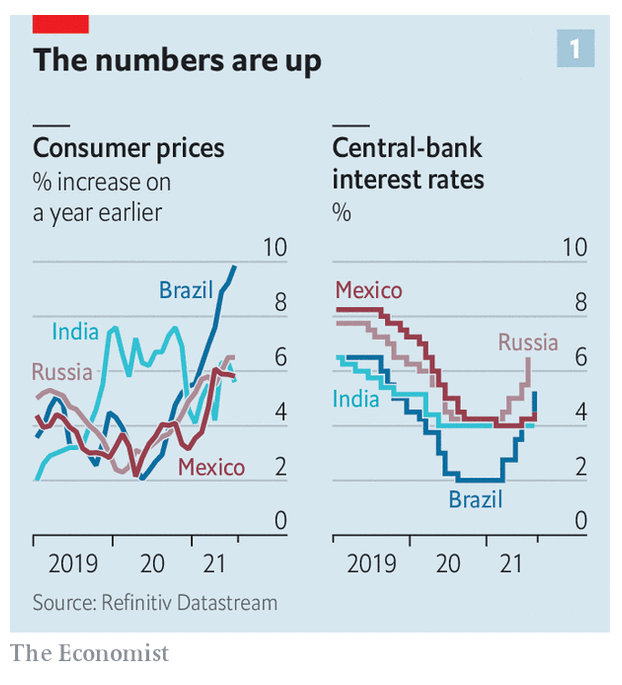 For this article, the Inflation rate factor is notable especially given that Nigeria’s multi-year inflation average appears to be shifting upwards to 15% from the prior ten-year ranges of 12%.
For this article, the Inflation rate factor is notable especially given that Nigeria’s multi-year inflation average appears to be shifting upwards to 15% from the prior ten-year ranges of 12%.
- Specifically, our average inflation rate between 1999 to 2009 was 12.08%, whilst average inflation rate for 2010 to 2020 was 12.06%
- However, the recent trailing 5-year average inflation (2016 to 2020) is now spiking to 14.6%. More alarming is that the 2021 inflation rate trend will likely push this 5-year trailing average even higher.
Why does this matter?
Naira and domestic inflation
As noted above, the rate of inflation in an economy is one of the quantitative factors which impacts a currency’s exchange rates.
Specifically, if the rate of inflation in your economy is low then you should expect to attract more foreign capital to your economy compared to other countries where inflation is higher.
Conversely, if an economy is experiencing high rate of inflation, the effect on the currency is a double whammy whereby
- Domestic savers/investors experience loss in value of money, leading to a potential loss of confidence in the currency as a store of value.
- This is in addition to foreign investors being discouraged by the risk of negative real returns on investment.
For context,
- Given Nigeria’s prior multi-year average inflation rate of 12% this means that if you had N1 million in 2000, that same money is worth less than N78,000 after twenty years (i.e.by 2020)
- Now imagine Nigeria’s new normal of 15% multi-year inflation average. This would mean that your N1million would be worthless than N100,000 in only 15 years
In other words, the higher the inflation, the faster your money loses value. Thus, high-inflation rates discourage both foreign and domestic investors and potentially leads to domestic savers actively seeking to move capital offshore to more stable currencies
Inflation rate differential
From a global trade perspective, what is more notable is that as your currency loses value at home due to high inflation, it will also lose value when compared to international currency pairs used for global trade.
- The key term here is inflation rate differential. This is simply the difference between inflation rate in Nigeria versus inflation rate in other countries.
- Inflation rate differential is a key component of exchange rate analysis such that economists track this indicator using various metrics including PPP (purchasing power parity).
For the Naira, the inflation rate differential is almost double digits against major currencies such as the United States (USD), UK (GBP) and EUR).
- Specifically, Nigeria’s average inflation rate for 1999 – 2020 period was approximately 12.1%, whilst US, UK and Europe all have an average inflation rate of sub 2.5% for the same period. This suggests an inflation differential of between 9% to 10%.
This near double-digit inflation differential is alarming because it simply means that over time from a Naira perspective, you will always need more money to buy the same foreign goods (all things being equal).
- For context, using the Naira’s inflation differential of approximately 9.5%.
- This suggests that if you needed N100 to buy USD$1.00 worth of goods in 2000, over a 20-year time you’ll need about N614 by 2021 end.
- That is 100 compounded at 9.5% over 20 years.
- If this sounds familiar, that is because Naira’s nominal exchange rate actually moved from the low N100s/$1 in December 2000 to current state of circa N560/USD$1 as of November 2021. I’m sure some skeptics will say the exchange rate is “turning on its own”.
Nonetheless, the key point here is that the worse your inflation differential becomes, the higher the risk of your currency depreciating faster.
- A recent article by Jonas Goltermann from Capital Economics discusses high-inflation rate differentials and potential for exchange rate volatility here
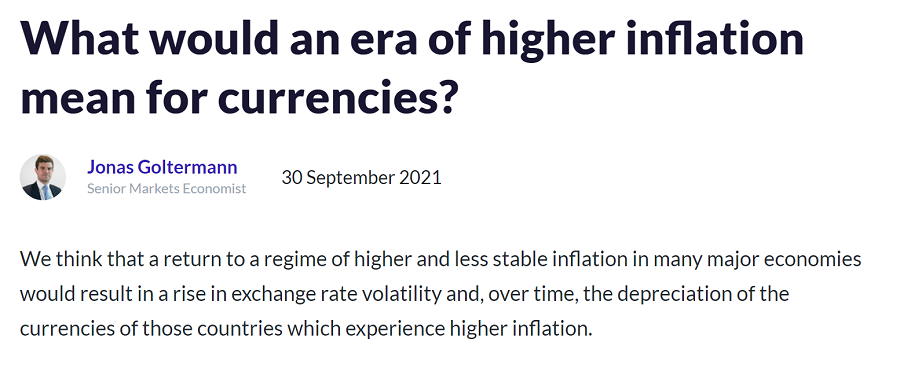 What is the Bottom-line?
What is the Bottom-line?
The issue for the Naira is that, regardless of how much effort is exerted by the CBN and monetary policymakers to manage consumer demand, Naira’s continuous devaluation trend will persist against the major currencies, especially as our high inflation rates simply leave the monetary authorities with little choice than to eventually devalue Naira over the medium to long term.
Therefore, the debate can continue to rage as to the merits and demerits of CBN spearheading development finance initiatives such as Agriculture, Power, Healthcare, SMEs etc.
Additionally, discussions can continue regarding how best to pressure policymakers towards taking more aggressive actions to attract more foreign investments and promote exports.
However, more urgent attention needs to be paid to the fundamental issue of reducing Nigeria’s double-digit inflation rates differentials vs the major currencies of the developed world.
Fighting inflation cannot be the sole responsibility of monetary policy authorities to address this trend.
Nigeria’s Fiscal policy authorities need to sit up to urgently lead the drive to a single-digit inflation economy for the Naira’s sake.
In the interim, savvy investors who previously aimed to surpass the 12% hurdle rate on investments will do well to adjust to asset classes that can surpass the newly emerging 15% hurdle rate.




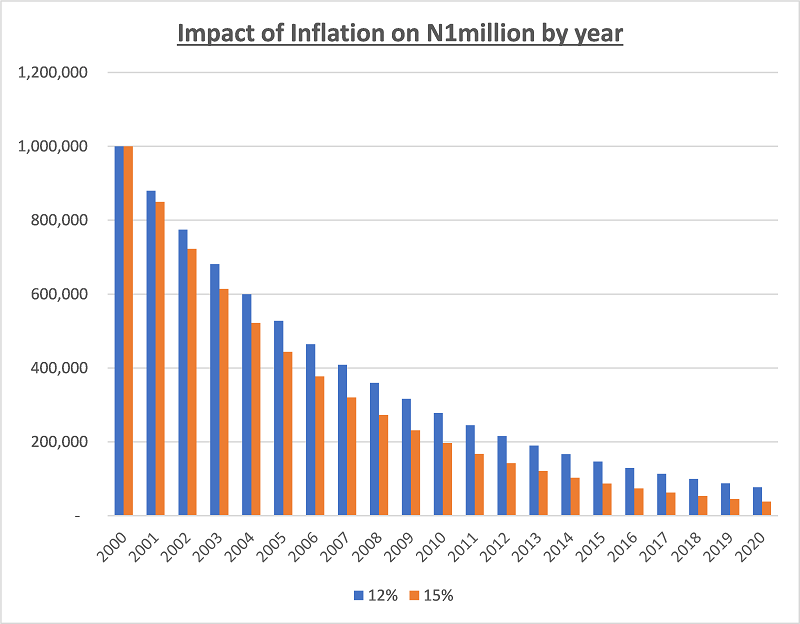




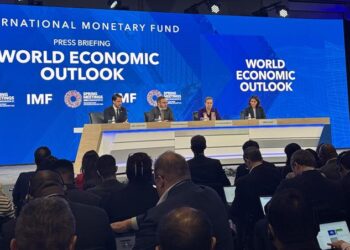










I think insecurity plays a major role in rising inflation. Even the price of domestic goods is rising sharply this can be traced partly to insecurity… Take agriculture for instance, output is reducing as farmers abandon farms because they are targeted by kidnappers and bandits.
If insecurity bis handled properly the policies of CBN will have a more lasting impact. In my humble opinion.
Very informative